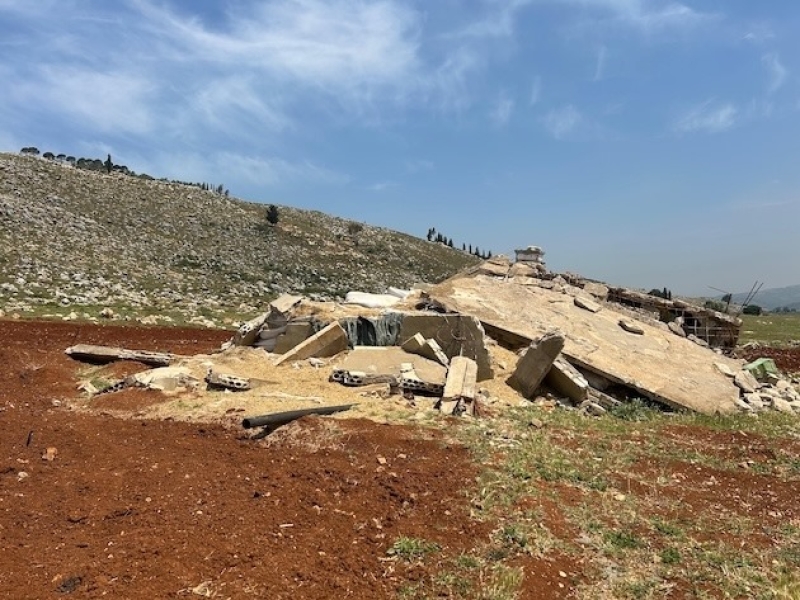- Dhaka’s air quality world’s worst Tuesday with an AQI of 240 |
- Heads of Sonali Bank, IDRA, and SBC resign citing personal reasons |
- Fakhrul calls attack on Iran 'horrible' |
- AI Moves Closer To Decoding Human Thoughts |
Displaced Farmers in Southern Lebanon Face Food and Land Crisis

Damaged greenhouse in Bent Jbeil, Nabatieh governorate.
Food security and livelihoods in southern Lebanon remain under severe threat as the effects of Israeli bombardment continue to impact the region, a report released on November 10 has warned.
Nearly a year after a ceasefire was agreed, many farmers in southern Lebanon are still denied access to their land due to displacement, ongoing Israeli attacks, and soil contamination, according to a joint report from Action Against Hunger, Oxfam, and Insecurity Insight.
The report highlights that repeated attacks have destroyed farmland, crops, and essential food infrastructure, threatening food security in some of the country’s most fertile areas.
“Food insecurity affects around a fifth of Lebanon’s population. Damage and displacement are devastating production in fertile lands, and as winter approaches, more families face hunger and poverty,” said Suzanne Takkenberg, Action Against Hunger Country Director.
The report, titled “We Lost Everything: The Impact of Conflict on Farmers and Food Security in Lebanon,” details how repeated attacks have disrupted agricultural supply chains, limiting access to seeds, fertilizer, fuel, workers, and equipment, while damaged roads hinder the transport of goods.
Displacement and lack of access to farmland remain major challenges. Nearly half of the farmers interviewed had been internally displaced, and approximately 82,000 people remain unable to return home due to continued occupation and armed violence.
“Agricultural losses are not only caused by shelling. When farmers cannot reach their land, fields go unplanted, and food disappears,” said Christina Wille, Director of Insecurity Insight.
Farmers have also reported contamination from explosive remnants of war (ERW) and white phosphorus, which harm soil fertility and crop growth, further threatening livelihoods and food security.
“Our findings show around 90% of farmers interviewed have seen their food production drop since October 2023. This is a systemic collapse, not a seasonal shock,” said Drew East, Researcher at Insecurity Insight.
The conflict has also destroyed homes, livestock, and agricultural assets in southern Lebanon and Bekaa, affecting not just farmers but entire communities dependent on them for food.
“Farmers have lost everything, impacting both families and the communities they feed,” Wille added.
Climate stress, including historically low rainfall and drought, is exacerbating the crisis. Takkenberg emphasized the urgent need to restore hope for affected farmers and communities.
Experts stress that full recovery will remain impossible until the ceasefire is fully respected and Israeli forces withdraw.
“The repeated attacks on farmland are destroying livelihoods and undermining Lebanon’s food security. There must be an immediate end to violations and full withdrawal of forces to allow farmers to return safely and rebuild their lives,” said Bachir Ayoub, Oxfam in Lebanon Country Director.
The report calls for financial support, cessation of hostilities, and clearance of ERW-contaminated land to help farmers resume production.
Previous reports noted that attacks on water infrastructure had left at least 150,000 people without running water, with estimated losses of USD 171 million across water, wastewater, and irrigation sectors.
All parties to the conflict are urged under International Humanitarian Law to protect objects indispensable to civilian survival, including food, farmland, crops, and livestock.
“The most urgent priority is helping people safely return home, work the land, and address food insecurity,” Wille said.
“Our teams are working in this volatile environment to restore livelihoods, rebuild infrastructure, and provide agricultural inputs. Lasting peace is essential for a full recovery,” Takkenberg added.

